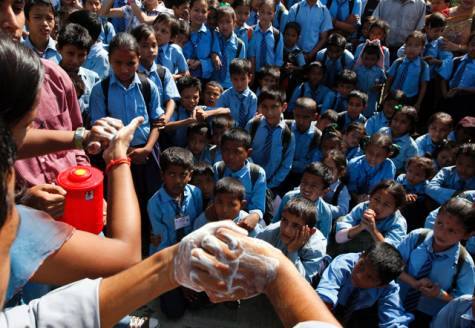|
Water
and Sanitation for All needs T he much awaited and taunted year 2015 is already here. This would be remembered in history for our collective failure primarily on account of the abysmal performance in meeting the Millennium Development Goal (MDG) target for sanitation. It is shocking and shameful to note that about a billion people worldwide still do not have access to basic sanitation and defecate openly. A vast majority of them live in countries like India and Nigeria. Besides the fundamental loss of human dignity, the overall economic impact of inadequate sanitation in India is estimated at INR 2.4 trillion, equivalent to 6.4% of the country’s GDP (WSP, 2010).
Though the world has targeted halving the number of people without access to sanitation by 2015, it is apparent that improvements in access to basic sanitation facilities are unlikely to be met until 2026 unless we bring a paradigm shift in our approaches. Selection of targets, indicators and performance measures are of high relevance in meeting the goals. Research has shown that for both water and sanitation goals, greater benefits are accrued at the household level than at the community level. Therefore, it is being suggested that the post 2015 Sustainable Development Goals (SDGs) should consider a household level benchmark for both. Out of the three components of WASH (water, sanitation and hygiene), hygiene behaviour has been shown to have the biggest impact on community health. Despite its merit as the most cost effective public health intervention, ironically there was no global target to improve hygiene during the MDG era. It has become evident that the MDG framework has fallen short of addressing quality, sustainability and equity issues. Realising the significance of water in the global development agenda; an emerging consensus for a post-2015 development framework for water has brought access to safe water, sanitation and hygiene under one single target. Addressing the gaps in the MDG framework, one of the key targets recommended by UN Water for the Post 2015 Global Goal for Water is to eliminate open defecation by 2030 in order to achieve universal access to basic drinking water, sanitation and hygiene for households, schools and health facilities. Achieving this goal requires new approaches and innovative thinking. Since safe drinking water and sanitation are important determinants of human health and wellbeing, access to them has rightly been declared as a human right by the international community recently. While governments are catching up to ensure right to water, civil society organisations such as Development Alternatives are promoting Household Water Treatment and Safe Storage (HWTS) and hygienic practices, including business models in WASH service. Integrated water management approaches, institutional level systems and processes for capacity building, innovations in technology application for behaviour change, innovative partnerships, financing and delivery models will become the cornerstone for attaining equity and sustainability in achieving WASH services at scale. Going forward, it is crucial that CSO practitioners interface with academic institutions in evidence gathering and inform policy makers and investors to create enabling conditions where scalable innovations can flourish. Let us strive to ensure that human rights aspirations lead to public policy reforms and public health outcomes in the Post 2015 SDG era. q Dr. K Vijaya Lakshmi
|